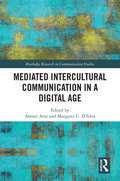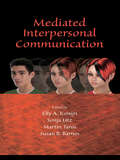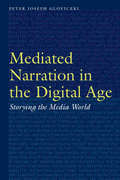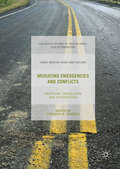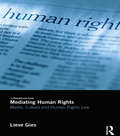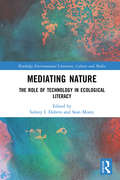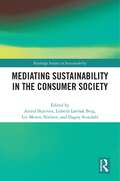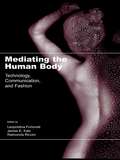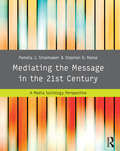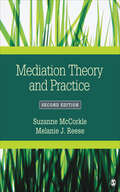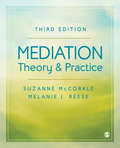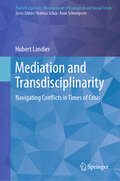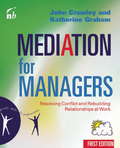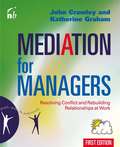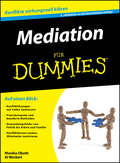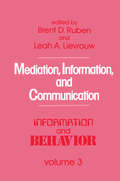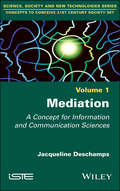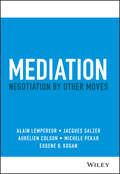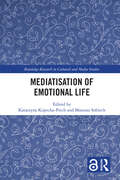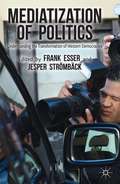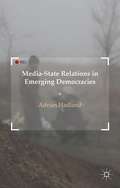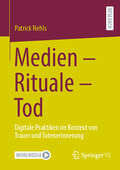- Table View
- List View
Mediated Intercultural Communication in a Digital Age (Routledge Research in Communication Studies)
by Ahmet Atay Margaret U. D'SilvaThis book focuses on mediated intercultural communication in the context of globalization. Analyzing social and traditional media using qualitative, interpretive, and critical and cultural perspectives, contributors engage with diverse topics - ranging from hybrid identities in different communities, to journalistic collaborations in the global media landscape. In addition, the authors also examine the placeless and borderless communities of diaspora members, their transnational identities, and the social media stories that shape and are shaped by them.
Mediated Interpersonal Communication
by Elly A. Konijn Sonja Utz Martin Tanis Susan B. BarnesMediated interpersonal communication is one of the most dynamic areas in communication studies, reflecting how individuals utilize technology more and more often in their personal interactions. Organizations also rely increasingly on mediated interaction for their communications. Responding to this evolution in communication, this collection explores how existing and new personal communication technologies facilitate and change interpersonal interactions. Chapters offer in-depth examinations of mediated interpersonal communication in various contexts and applications. Contributions come from well-known scholars based around the world, reflecting the strong international interest and work in the area.
Mediated Narration in the Digital Age: Storying the Media World (Frontiers of Narrative)
by Peter Joseph GloviczkiMediated Narration in the Digital Age examines mediated narration from 1991 through 2018. Peter Joseph Gloviczki considers this pivotal period spanning the rise of the World Wide Web through the growth of social media to understand how contemporary media accounts storied everyday life and times of crisis. He uses examples across media culture to show that complicated issues benefit from a critical poststructuralist approach to journalism, which promotes a communitarian ethos of respect, inclusion, and dialogue. Textual analysis of a wide range of media narratives—from a 2012 YouTube clip outlining a time line of the Sandy Hook school shootings, to coverage of then-newly-discovered footage of President Roosevelt in a wheelchair in 2013, to the Cincinnati Enquirer&’s 2017 piece &“Seven Days of Heroin&”—illustrate how theoretical concepts work in practice while explaining the new media environment. In response to the lack of awareness of news as mediated narration, Gloviczki calls for journalists to be aware of their role in meaning-making and the attendant ethical responsibilities. He provides the analysis essential to effective practice that emphasizes the connection between the individual and the community in order to more fully represent the mediated body.
Mediating Emergencies and Conflicts
by Federico M. FedericiContributors to this volume discuss different types of emergencies and conflicts and how challenging these multilingual operational environments are for linguists. The growth in reach and number of international relief operations has exposed the limits of current research into these challenges. Evidence in disaster management studies suggests communication remains a major operational issue. This book calls for enhanced focus on the role of translators and interpreters in emergencies by discussing existing research and questions which have emerged from experience in the field. Contributions in this volume undeniably demonstrate the need for multidisciplinary studies in mediating multilingual emergencies. They consider emergencies in hospitals (Cox and Lázaro Gutiérrez), in disaster response (Dogan), in bespoke training to translators in fast-developing crises (O'Brien), and in planning responses in predictably dangerous habitats (Razumovskaya & Bartashova). The volume also illustrates scenarios in which discourse on language mediation shows bias by limiting political dialogues (Al Shehari), by conditioning news reporting (Skorokhod), and by enforcing stereotypical notions of linguists in wars (Gaunt).
Mediating Human Rights: Media, Culture and Human Rights Law
by Lieve GiesDrawing on social-legal, cultural and media theory, this book is one of the first to examine the media politics of human rights. It examines how the media construct the story of human rights, investigating what lies behind the apparent media hostility to human rights and what has become of the original ambition to establish a human rights culture. The human rights regime has been high on the political agenda ever since the Human Rights Act 1998 was enacted. Often maligned in sections of the press, the legislation has entered popular folklore as shorthand for an overbearing government, an overzealous judiciary and exploitative claimants. This book examines a range of significant factors in the mediation of human rights, including: Euroscepticism, the war on terror, the digital reordering of the media landscape, , press concerns about an emerging privacy law and civil liberties. Mediating Human Rights is a timely exploration of the relationship between law, politics and media. It will be of immense interest to those studying and researching across Law, Media Studies, Human Rights, and Politics.
Mediating Nature: The Role of Technology in Ecological Literacy (Routledge Environmental Literature, Culture and Media)
by Sean Morey Sidney I. DobrinMediating Nature considers how technology acts as a mediating device in the construction and circulation of images that inform how we see and know nature. Scholarship in environmental communication has focused almost exclusively on verbal rather than visual rhetoric, and this book engages ecocritical and ecocompositional inquiry to shift focus onto the making of images. Contributors to this dynamic collection focus their efforts on the intersections of digital media and environmental/ecological thinking. Part of the book’s larger argument is that analysis of mediations of nature must develop more critical tools of analysis toward the very mediating technologies that produce such media. That is, to truly understand mediations of nature, one needs to understand the creation and production of those mediations, right down to the algorithms, circuit boards, and power sources that drive mediating technologies. Ultimately, Mediating Nature contends that ecological literacy and environmental politics are inseparable from digital literacies and visual rhetorics. The book will be of interest to scholars and students working in the fields of Ecocriticism, Ecocomposition, Media Ecology, Visual Rehtoric, and Digital Literacy Studies.
Mediating Sustainability in the Consumer Society (Routledge Studies in Sustainability)
by Dagny Stuedahl Astrid Skjerven Lisbeth Løvbak Berg Liv Merete NielsenThis book sheds light on the role and impact of sustainability mediation, an effective tool for political authorities and business enterprises to persuade consumers of the integrity of their actions, products, and services.In this era of ecological and societal crises fuelled by increasing consumption, sustainability has become a key buzzword and target to attain. Governments around the world argue that they will meet their sustainability goals through environmental actions, by enabling consumers to make better choices and expecting brands to respond accordingly. At the same time, consumers are overwhelmed by the messaging conveyed in sustainability marketing campaigns, often featuring misleading greenwashing, with political authorities, organisations, and business enterprises all having conflicting interests. In this complex scenario, mediation has become a crucial issue. This book offers a critical and multidisciplinary view of sustainability mediation from experts in the fields of philosophy, consumption research, media studies, fashion, design, and citizenship, offering a unique, holistic view. Each chapter highlights different and problematic aspects of the cultural narratives being communicated, for example, the necessity of growth and the notion of a green economy. They present current theories, methods, indicators, and strategies used to assess and measure the relation between mediation, behaviour, and sustainable development.This book is of interest to scholars, researchers, and postgraduate students in all subject fields concerned with sustainability, including design, visual communication, fashion, consumption, media and journalism, and sustainable development.
Mediating the Human Body: Technology, Communication, and Fashion
by James E. Katz Leopoldina Fortunati Raimonda RicciniThe ever-increasing integration of technology and the human body is attracting attention from religious, business, and political leaders around the world, and the topic promises to be a significant social issue in the 21st century. In Mediating the Human Body: Technology, Communication, and Fashion, editors Leopoldina Fortunati, James E. Katz, and Raimonda Riccini bring together a thoughtful group of leading international scholars and analysts to explore the effects of new technologies on human beings. They focus specifically on the intersection of new communication technologies and the body, and offer novel insights based on recent theoretical progress and current research on new interpersonal technology. Through literary analysis, historical comparisons, analytical reports, and speculative interpretations, the contributors to this volume seek to understand the experience of the body as it is mediated among competing forces and intellectual domains. Arising from The Human Body Between Technologies, Communication and Fashion symposium held in Milan, Italy, contributions cover a wide array of topics and offer varied perspectives on how communication technologies are assimilated into people's lives, bodies, and homes, and thus become part of individuals' self-images and social relationships. From this multidisciplinary, multi-national base, the volume illuminates the sense and dimension of this interpenetration between body and technology. In its broad scope, the topics range from the wellsprings of consciousness to the use of technology as a fashion statement. Bringing together scholarship from a variety of disciplines, including communication, medicine, technology, and human-computer interaction, this distinctive anthology will provide new insights to scholars and advanced students exploring body-technology intersections and the attendant implications. Mediating the Human Body offers a unique contribution to future discussions, and will be relevant to continuing study and research in communication and technology, human-computer interaction, gender studies, social psychology, and design.
Mediating the Message in the 21st Century: A Media Sociology Perspective
by Stephen D. Reese Pamela J. ShoemakerHailed as one of the "most significant books of the twentieth century" by Journalism and Mass Communication Quarterly, Mediating the Message has long been an essential text for media effects scholars and students of media sociology. This new edition of the classic media sociology textbook now offers students a comprehensive, theoretical approach to media content in the twenty-first century, with an added focus on entertainment media and the Internet.
Mediation Theory and Practice
by Suzanne Mccorkle Melanie J. ReeseBlending theory and research with practical application, Mediation Theory and Practice, Second Edition, by Suzanne McCorkle and Melanie J. Reese, provides a thorough introduction to today’s ever expanding world of mediation, including updated research and new cases for analysis. Innovative yet practical, research-based yet readable, the book provides an overview of the basic principles of mediation in a variety of contexts to help readers understand mediation and its role in today’s society. Throughout the book, the authors help readers develop foundational mediation skills, including issue identification, setting the agenda for negotiation, problem solving, settlement, and closure. Case studies and examples in every chapter, plus an appendix of role-playing scenarios, make this book ideal book for both college courses and certification training programs.
Mediation Theory and Practice
by Melanie J. Reese Suzanne McCorkleBlending theory and research with practical application, Mediation Theory and Practice, Second Edition, by Suzanne McCorkle and Melanie J. Reese, provides a thorough introduction to today’s ever expanding world of mediation, including updated research and new cases for analysis. Innovative yet practical, research-based yet readable, the book provides an overview of the basic principles of mediation in a variety of contexts to help readers understand mediation and its role in today’s society. Throughout the book, the authors help readers develop foundational mediation skills, including issue identification, setting the agenda for negotiation, problem solving, settlement, and closure. Case studies and examples in every chapter, plus an appendix of role-playing scenarios, make this book ideal book for both college courses and certification training programs.
Mediation Theory and Practice
by Melanie J. Reese Suzanne McCorkleMediation Theory and Practice, Third Edition introduces students to the process of mediation by using practical examples that show students how to better manage conflicts and resolve disputes. Authors Suzanne McCorkle and Melanie J. Reese help students to understand the research and theory that underlie mediation, as well as provide students with the foundational skills a mediator must possess in any context, including issue identification, setting the agenda for negotiation, problem solving, settlement, and closure. New to the Third Edition: Expanded content on the role of evaluative mediation reflects the latest changes to the alternative dispute resolution field, helping students to distinguish between various approaches to mediation. Additional discussions around careers in conflict management familiarize students with employment opportunities for mediators, standards of professional conduct, and professional mediator competencies. New activities and case studies throughout each chapter assist students in developing their mediation competency.
Mediation Theory and Practice
by Melanie J. Reese Suzanne McCorkleMediation Theory and Practice, Third Edition introduces students to the process of mediation by using practical examples that show students how to better manage conflicts and resolve disputes. Authors Suzanne McCorkle and Melanie J. Reese help students to understand the research and theory that underlie mediation, as well as provide students with the foundational skills a mediator must possess in any context, including issue identification, setting the agenda for negotiation, problem solving, settlement, and closure. New to the Third Edition: Expanded content on the role of evaluative mediation reflects the latest changes to the alternative dispute resolution field, helping students to distinguish between various approaches to mediation. Additional discussions around careers in conflict management familiarize students with employment opportunities for mediators, standards of professional conduct, and professional mediator competencies. New activities and case studies throughout each chapter assist students in developing their mediation competency.
Mediation and Transdisciplinarity: Navigating Conflicts in Times of Crisis (Transdisciplinary Management of Ecological and Social Crises)
by Hubert LandierThe world is in crisis at every level: the planet, humanity, and all kinds of human communities, including working communities. The result is likely to be violence and chaos. And yet, man lives and can only live with others. Relationships in all their forms therefore need to be developed with a view to building a common future. However, when this in-between has been broken, when it is no longer possible to get along, when violence threatens or develops in a sometimes dramatic way, it may be necessary for both sides to call on an external third party. This book is based on decades of professional experience in the practice of corporate mediation. It examines the crucial role of mediators in resolving conflicts and fostering understanding in various contexts. By exploring real-life case studies and theoretical frameworks, the book offers valuable insights into how mediation can be a powerful tool for creating a harmonious and sustainable future.
Mediation for Managers
by Katherine Graham John CrawleyMediating managers can often deal with different demands, personalities, and behaviors. Discover how to set a positive example on a professional and personal level with Mediation for Managers. Readers will learn to eliminate the stress, illness, and staff losses than can result from conflict, and extract positive results from managed conflicts.
Mediation for Managers: Resolving Conflict and Rebuilding Relationships at Work
by Katherine Graham John CrawleyIn recent years mediation has become an increasingly popular approach and powerful technique and has been used successfully in such areas as commercial disputes and customer complaints-handling. Here, for the first time, is an accessible and practical book on mediation at work and in the workplace itself. Packed with real-life examples and cases, it focuses on mediation's positive way of looking at conflict, how it injects a new dimension into people's "conflict zone", and outlines the qualities needed to be a mediating manager. Mediating managers become beacons of positive energy perceived as people capable of holding things together when others are "losing it". They are able to do this because they are enablers, not judge and jury, catalysts not fixers, encouragers not enforcers. Mapping out the overall steps of the mediation process, what mediating managers' core tasks are at each stage, the opportunities offered to those involved, and illustrating different key moments of effectively resolved workplace disputes, the book demonstrates how transferable mediation skills are and how they can be used in a wide range of workplace settings.
Mediation for Managers: Resolving Conflict and Rebuilding Relationships at Work
by Katherine Graham John CrawleyIn recent years mediation has become an increasingly popular approach and powerful technique and has been used successfully in such areas as commercial disputes and customer complaints-handling. Here, for the first time, is an accessible and practical book on mediation at work and in the workplace itself. Packed with real-life examples and cases, it focuses on mediation's positive way of looking at conflict, how it injects a new dimension into people's "conflict zone", and outlines the qualities needed to be a mediating manager. Mediating managers become beacons of positive energy perceived as people capable of holding things together when others are "losing it". They are able to do this because they are enablers, not judge and jury, catalysts not fixers, encouragers not enforcers. Mapping out the overall steps of the mediation process, what mediating managers' core tasks are at each stage, the opportunities offered to those involved, and illustrating different key moments of effectively resolved workplace disputes, the book demonstrates how transferable mediation skills are and how they can be used in a wide range of workplace settings.
Mediation für Dummies (Für Dummies)
by Al Weckert Monika ObothGibt es in Ihrem Leben Konflikte - beruflich oder privat -, die Sie gern lösen würden, ohne gleich einen Anwalt zu konsultieren oder gar einen Prozess anzustrengen? Dann ist dieses Buch genau das richtige für Sie. Monika Oboth und Al Weckert informieren anhand von vielen Fallbeispielen über die Einsatzmöglichkeiten, Inhalte und Methoden von Mediation als Mittel zur außergerichtlichen Konfliktklärung. Ob bei Trennung, Scheidung oder Erbstreitigkeiten, bei Konflikten in der Schule oder im Beruf oder bei Streitigkeiten zwischen Vertragspartnern - dieses unbürokratische Verfahren ermöglicht es Konfliktparteien, selbst ihre Lösung zu finden. Die Autoren beschreiben die fünf Phasen der Mediation, die Gesprächstechniken und Frageformen, den Umgang mit Gefühlen sowie Eskalationen und zeigen, wie durch Gewaltfreie Kommunikation Verständigung erreicht werden kann. So erfahren Sie, was Sie bei einer Mediation erwartet. Für all jene, die sich als Mediator zusätzlich qualifizieren wollen - Lehrer, Sozialpädagogen, Therapeuten, Personalentwickler oder Juristen - beschreiben die Autoren das Profil und das Handwerkszeug von Mediatoren.
Mediation, Information, and Communication (Information And Behavior Ser. #Vol. 3)
by Brent D. Ruben and Leah A. LievrouwThis third volume of Information and Behavior shows broad continuities with previous volumes in this series, but it also represents an important evolution. In emphasizing theoretical advances in mediation, information, and communication processes, this volume has unifying themes at the cutting edge of communication research, linking communication with areas as far-ranging as cognitive psychology, intellectual history, social psychology, policy, and macroeconomics.A sampling of the contents indicates both continuities and discontinuities of communication research embodied in this volume. Contributions include Joseph Turow, "Mass Communication as Concept"; Gary Grumpert and Robert Cathcart, "A Theory of Mediation;" Leah Lievrouw and T. Andrew Finn, "Common Dimensions of Communication"; Joshua Meyrowitz, "Mediated and Unmediated Behavior"; Kathleen Reardon, "Teaching Children About AIDS"; Sari Thomas, "The Death of Intellectual History and the Birth of the Transient Past"; Sheizaf Rafaeli, "Interacting with Media."The second part of the work, emphasizing research and policy in specific information societies and regions, includes an opening essay by Everett M. Rogers, and follow-up studies by Judith K. Larsen on "Silicon Valley"; Quentin W. Lindsey on "The North Carolina Research Triangle"; Luis Fonseca, "High Technology in Brazil"; Ruyzo Ogasawara, "High Technology in Japan"; and Mitchell Moss, "Telecommunications and Financial Centers."The final two portions of the book cover social theory and cultural processes. They include articles by Jerry Salvaggio and Richard Nelson, "Models for Developing Telecommunications and Information Industries"; Everett M. Rogers and James Dearing, "University-Industry Technology Transfer"; Frederick Williams, "The Communications Revolution Revisited"; Rolf Wigand, "Recurring Questions about the Information Society"; Lee Thayer, "Tropes and Things"; Gordon L. Miller, "The Energy of Intelligence"; David Carr, "Thinking in Museums;" Benjamin J. Bates, "Information as an Economic Good"; Jorge Schement and Daniel Stout, "A Time-Line of Information Technology."
Mediation: A Concept for Information and Communication Sciences
by Jacqueline DeschampsMediation is a very old practice that has been reborn to meet the needs of the contemporary world. It is thus increasingly present in today's societies. This book presents the theoretical foundations of mediation, as well as the way in which teachers and researchers in Information and Communication Sciences (ICS) have taken up this concept. Whether it is communicational, informational, cultural, organizational or societal, mediation belongs to a field of research, instituted by ICS, which sees in it a process of overcoming conflict, restoring communication and deconstructing social connections. Mediation: A Concept for Information and Communication Sciences inaugurates this set through its contribution to a state of the art of the theory and concepts used by the ICS community. It is addressed to teachers, researchers and students, as well as information professionals wishing to think about their daily practice.
Mediation: Negotiation by Other Moves
by Alain Lempereur Aurelien Colson Michele Pekar Jacques Salzer Eugene B. KoganWhen negotiation fails, mediation avails other moves for an amicable resolution. Whether you are a current or future mediator or a party to a conflict, this is your essential companion to the theory, concepts, and best practices of mediation. In a world ridden by social divisions, responsible resolution of conflicts is more timely than ever. What happens when parties are unable to negotiate an agreement together? The next move is to invite a third party to reset the negotiations, facilitate the exchanges, rebuild a working relationship and empower the parties to explore the past, surface their present needs, invent, evaluate and choose the best solutions for the future. Mediation: Negotiation by Other Moves brings decades of critical analysis and experience that the authors tested worldwide in international organizations, governments, NGOs, universities and corporations. You will understand mediation better, and its significance in your personal and professional life. You will be able to develop a flexible mindset and a broad outlook to achieve sustainable outcomes. This book will cover: Models and principles from various domains of mediation: family, business & labor, public affairs, international relations A mediation framework to prepare for mediation and to run its process smoothly A step-by-step approach to a mediation session, from the opening until a possible settlement, via the various phases of problem solving Mediation traps and how to avoid them—for mediators and parties alike Ethics of mediation and questions of responsibility Mediation: Negotiation by Other Moves is essential reading for anyone who wishes to develop a pragmatic approach to mediation.
Mediatisation of Emotional Life (Routledge Research in Cultural and Media Studies)
by Katarzyna Kopecka-Piech Mateusz SobiechThis volume brings together an international team of authors to investigate a wide range of issues concerning the fundamental role of media technologies in shaping contemporary emotional life. Chapters explore key aspects of the mediatisation of emotional life, feelings and interpersonal relations: love, intimacy, loneliness, friendship, family relations, erotic, sexual and romantic experiences. The authors explain the key aspects of strong user–media relationships and human relationships based on media use and investigate problems such as the formation of identity based on social media, the role of communication applications and the effects of mobile and locative media on our relationships, as well as artificial intelligence, on our perception of our emotions. With a focus on new media, the book also draws on the scope of traditional media that express and shape emotions, taking into account the classic approaches to emotionality of messages from the perspective of film creators and recipients. This cutting-edge collection will be of interest to scholars and students of media and communication studies, especially digital media and new technologies, psychology, pedagogy, sociology of everyday life and cultural studies. Chapter 5 of this book is freely available as a downloadable Open Access PDF under a Creative Commons Attribution 4.0 license https://www.taylorfrancis.com/chapters/oa-edit/10.4324/9781003254287-8/love-jono-van-belle?context=ubx&refId=0deb9108-cd9e-4d98-b0b8-4f4ce1cce4c0 Chapter 10 of this book is freely available as a downloadable Open Access PDF under a Creative Commons Attribution 4.0 license https://www.taylorfrancis.com/chapters/oa-edit/10.4324/9781003254287-13/family-relations-tiina-r%C3%A4is%C3%A4?context=ubx&refId=2dec0bcd-cbba-493c-bbec-8cb5c6bd0086
Mediatization of Politics
by Jesper Str�mb�ck Frank EsserThe first book-long analysis of the 'mediatization of politics', this volume aims to understand the transformations of the relationship between media and politics in recent decades, and explores how growing media autonomy, journalistic framing, media populism and new media technologies affect democratic processes.
Media�State Relations in Emerging Democracies
by Adrian HadlandThe news media and the state are locked in a battle of wills in the world's emerging democratic states. It is a struggle that will determine whether or not democracy flourishes or withers in the 21st century. Using a number of case studies, including South Africa, this book evaluates what is at stake.
Medien - Rituale - Tod: Digitale Praktiken im Kontext von Trauer und Totenerinnerung
by Patrick NehlsPatrick Nehls widmet sich in diesem Buch den Verwicklungen von Medien und Ritualen in tiefgreifend mediatisierten Gesellschaften und analysiert deren konkrete Ausdrucksformen am Beispiel von Trauer und Totenerinnerung im Internet. Dazu untersucht der Autor Beiträge, die auf Instagram mit dem #beerdigung veröffentlicht worden sind und führt Interviews mit Menschen, die digitale und soziale Medien im Rahmen einer Verlusterfahrung genutzt haben. Auf Basis der Studien und der theoretischen Auseinandersetzung mit Konzepten aus den Medien-, Kultur- und Religionswissenschaften, der Soziologie und den Cultural Studies, konzipiert der Autor ein Modell zur Beschreibung von Medien und Ritualen, das nicht nur im Kontext von Trauer und Totenerinnerung angewandt werden kann.
